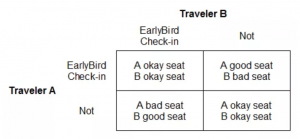Southwest Airline’s profitable strategy using Prisoner’s Dilemma
Link 1: https://thepointsguy.com/news/is-southwest-earlybird-check-in-worth-it/
Link 2: https://mindyourdecisions.com/blog/2013/03/05/southwest-airlines-boarding-and-game-theory/
Unlike other airlines such as United and Delta, Southwest Airlines employs an unconventional boarding method that utilizes the concept of open-seating, as some movie theatres do. Specifically, travelers are welcomed to choose from the remaining free seats to their personal likings during the boarding process rather than being assigned seatings on the time of check-in. However, the first-come-first-serve basis elicited issues as well as inconveniences as people who did not value their time (by lining up early at the gate to “save a seat”) were prioritized and people who cut lines caused commotions amongst travelers.
As a result, since 2009, Southwest Airlines introduced their newest EarlyBird Check-in service, which offers customers, as the name implies, an early spot in a new system that assigns boarding groups (A, B, C, etc.) and numbers (lower = earlier boarding) to travelers based on check-in times and prioritizes those who add an additional $10 to the payment of a one-way fare to reserve a “spot” and the best available boarding group/number. However, the reservation does not guarantee a good seat, but only an automatic check-in for the respective customer paying for the service.
From the perspective of the travelers, the introduction of the EarlyBird service essentially places the customers into a game that mirrors the well-known Prisoner’s Dilemma. In the context of game theory, incorporating the recent topics covered in the course, the situation can be modeled with travelers being the players of the PD-styled game. Consider 2 rational travelers/players A and B competing with each other, where the objective is to end up with a good seat. Each individual flyer has 2 strategies: pay $10 for possibly better seating, or pay $0 for lottery style seating. Considering the Nash Equilibrium concept, we have the table below.
source for image: Link 2
As shown, the “ideal” result is both players use the “Not” strategy to save money as well as still have okay seats, which is the same payoff as the Nash Equilibrium. However, as each player is competing against each other, the Nash Equilibrium exists when both travelers decide to opt in for the EarlyBird Check-in services, which appear “ideal” to the players. This in turn translates to massive amounts of profit for the airlines, more specifically $98 million in 2010 and $144 million in 2011.

